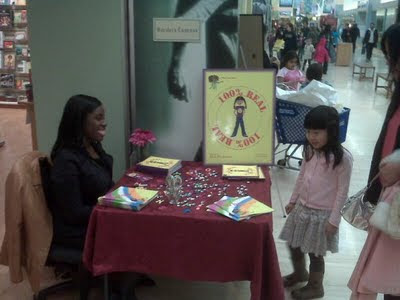7
Dec
December 7, 2009
Today’s guest blogger Tara Michener is very involved in promoting diversity and inclusion through education, public speaking, writing, and advocacy. She leads workshops on self-esteem, creative writing, diversity and social  networking for people of all ages. She is the author of The "Who I Am" book series which promotes self-esteem and diversity in kids, allowing them to feel comfortable talking about race and culture in a supportive and non-offensive way. To learn more about the "Who I Am" series or workshops and to inquire about speaking engagements, etc. Email: whoaimnotwhatiam@yahoo.com or visit www.taramichener.com
networking for people of all ages. She is the author of The "Who I Am" book series which promotes self-esteem and diversity in kids, allowing them to feel comfortable talking about race and culture in a supportive and non-offensive way. To learn more about the "Who I Am" series or workshops and to inquire about speaking engagements, etc. Email: whoaimnotwhatiam@yahoo.com or visit www.taramichener.com
 networking for people of all ages. She is the author of The "Who I Am" book series which promotes self-esteem and diversity in kids, allowing them to feel comfortable talking about race and culture in a supportive and non-offensive way. To learn more about the "Who I Am" series or workshops and to inquire about speaking engagements, etc. Email: whoaimnotwhatiam@yahoo.com or visit www.taramichener.com
networking for people of all ages. She is the author of The "Who I Am" book series which promotes self-esteem and diversity in kids, allowing them to feel comfortable talking about race and culture in a supportive and non-offensive way. To learn more about the "Who I Am" series or workshops and to inquire about speaking engagements, etc. Email: whoaimnotwhatiam@yahoo.com or visit www.taramichener.comThe rate of transracial adoptions are growing in the United States. It is a blessing that so many children are finding homes and families with loving people. I also think that the benefit of transracial adoptions allows educational opportunities to present themselves for families. In my 2nd children’s book "100% Real" Zoey feels sad when she is asked who she looks like. The kids at school want to know if she favors her mom and dad in appearance; Zoey is adopted and she does not look like her parents.
Do you think that this matters? Zoey’s parents help her to see that she is just like her parents in many ways despite her looks and that it is okay to look different from family. What do you think makes family strong? Does a family’s strength come from the appearance, the time that they spend together or something else that all families have just because they are families-a connection that no one can take away? A children’s book like this important to all children. It is great for those who have families like Zoey’s to see themselves represented in a book and have a character to relate to; it is also good for those who are not like Zoey’s family to learn about others in a positive and educational way.

In addition to adoption literature, there are several ways you can promote inclusion and diversity with your family. Cultural field trip days can be a great addition to family night. Try visiting museums that embrace culture and various ethnicities such as, African American culture museums, Holocaust Museums, etc. One of the most important tips that I can make is to be very careful of the company that you keep. If you are around people who make negative or exclusive comments about adoption, race, etc., find a new circle. It is important for your family to embrace culture and diversity and distance yourself from remarks and/or actions that could hurt your child’s self-esteem.
